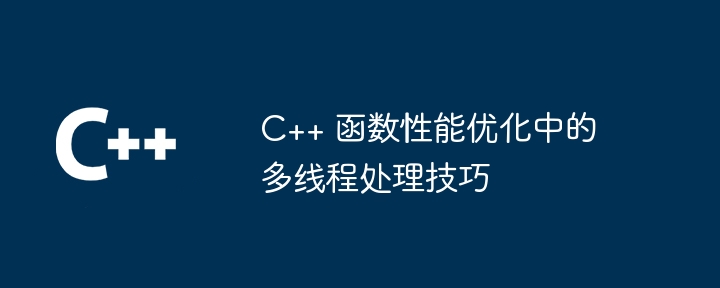Home >Backend Development >C++ >Multi-threading techniques in C++ function performance optimization
Multi-threading techniques in C++ function performance optimization
- 王林Original
- 2024-04-23 21:54:021036browse
Tips for optimizing function performance using C multithreading include: Identifying tasks that can be parallelized. Use thread pools to optimize thread creation and destruction overhead. Simplify parallel task scheduling and result retrieval using the std::future library. Break large tasks into smaller tasks for better load balancing. Using these techniques can significantly improve application efficiency and enable function parallelism and scalability.

Multi-threading techniques in C function performance optimization
Introduction
In modern multi-core processors, multi-threaded programming can significantly improve application performance. By parallelizing tasks into multiple threads, we can fully utilize the resources available in the processor. This article will explore techniques for using C multithreading to optimize function performance and provide a practical case.
Thread Notes
- Lock: Used to protect critical sections (blocks of code that can only be accessed by one thread at the same time) to Prevent data races.
- Atomic variables: Variables that are updated atomically, ensuring thread safety without locks.
- Mutex (Mutex): Used to control access to the critical section, only one thread can be allowed to enter at a time.
- Condition variable: Used to notify threads when specific conditions are met and used for inter-thread synchronization.
Tips for function parallelization
- Determine tasks that can be parallelized: Identify tasks that can be executed simultaneously and independently of each other Task.
- Use thread pools: Managing thread pools can help optimize the overhead of thread creation and destruction.
- Use the future library: Use the std::future library to simplify scheduling of parallel tasks and retrieval of results.
- Broken large tasks into smaller tasks: Breaking large tasks into smaller subtasks can achieve better load balancing.
Practical case
Let’s take a function that calculates the sum of a set of numbers as an example:
int sum_numbers(std::vector<int>& numbers) {
int result = 0;
for (int num : numbers) {
result += num;
}
return result;
}By parallelizing the summation operation into multiple threads, we can significantly improve performance:
int sum_numbers_parallel(std::vector<int>& numbers) {
// 创建用于管理线程的线程池
std::thread::hardware_concurrency(); // 确定处理器中核心数
std::thread_pool pool(num_cores);
// 创建一个 std::vector 来存储线程的未来
std::vector<std::future<int>> futures;
// 将任务并行化为多个子任务
const std::size_t chunk_size = 100;
for (std::size_t i = 0; i < numbers.size(); i += chunk_size) {
futures.push_back(pool.submit([&numbers, i, chunk_size]() {
int sum = 0;
for (std::size_t j = i; j < std::min(i + chunk_size, numbers.size()); ++j) {
sum += numbers[j];
}
return sum;
}));
}
// 收集未来结果并将其累加到总和中
int result = 0;
for (auto& future : futures) {
result += future.get();
}
return result;
} In this example, we use std::thread_pool to manage threads, and use std::future Retrieve the results of each subtask. chunk_size The parameter is used to control the size of the subtask, which can be adjusted to optimize performance.
Conclusion
Using multi-threading to optimize function performance can significantly improve the efficiency of your application. By following the tips outlined in this article and implementing real-world examples, developers can improve the parallelism and scalability of their C functions.
The above is the detailed content of Multi-threading techniques in C++ function performance optimization. For more information, please follow other related articles on the PHP Chinese website!

